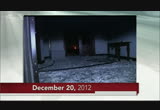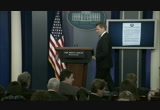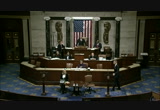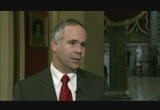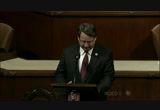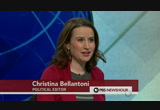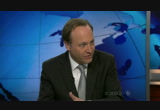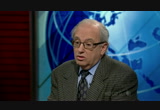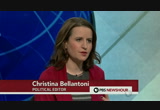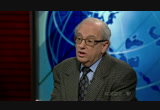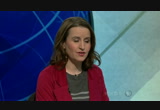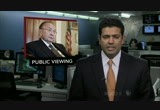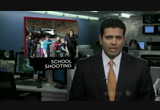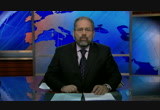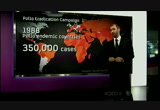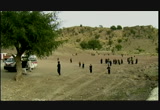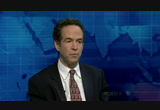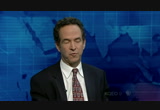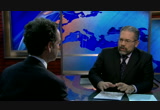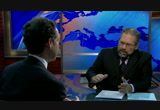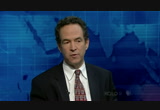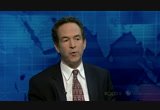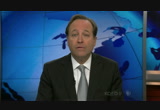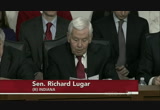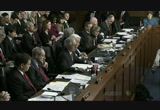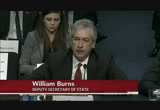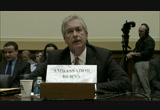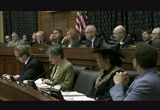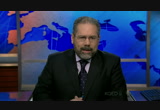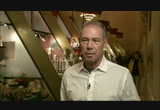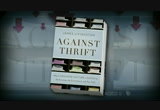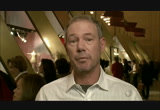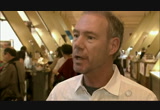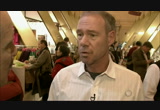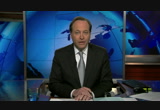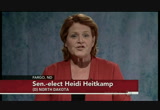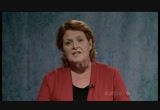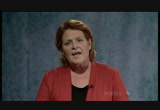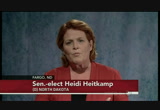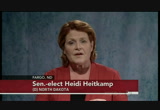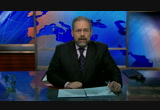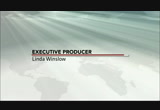tv PBS News Hour PBS December 20, 2012 6:00pm-7:00pm PST
6:00 pm
accepted blame in failing to protect the u.s. diplomatic mission in libya. >> we have to do better. we owe it to our colleagues who lost their lives in benghazi. we owe it to the security professionals who acted with such extraordinary heroism that awful night to try to protect them, and we owe it to thousands of our colleagues serving america with a great dedication every day in diplomatic posts around the world. >> brown: spending versus saving: amid the last-minute holiday rush, paul solman weighs the economic benefits. >> holiday season grand central terminal and a key question: is consumerism kind of a bad thing that's overdone this time of year? or is it the key driving economic and moral force in our society? >> suarez: and we close with another in our series of interviews with newly elected congressional members. tonight, north dakota's senator- elect, democrat heidi heitkamp. >> brown: that's all ahead on tonight's "newshour." >> major funding for the pbs newshour has been provided by:
6:01 pm
♪ ♪ moving our economy for 160 years. bnsf, the engine that connects us. >> and by the alfred p. sloan foundation. supporting science, technology, and improved economic performance and financial literacy in the 21st century. >> and with the ongoing support of these institutions and foundations. and... >> this program was made possible by the corporation for public broadcasting. and by contributions to your pbs station from viewers like you. thank you.
6:02 pm
>> brown: the u.s. house of representatives headed toward approval this evening of a tax plan that republicans backed and democrats said was a waste of time. the division demonstrated that efforts to get a bi-partisan agreement and avoid the fiscal cliff are stuck in stalemate. >> the house will be in order. >> brown: house republicans pushed their plan b. despite a veto threat from the white house and the strong opposition of senate democrats. speaker john boehner insisted the president had left him with no alternative. >> for weeks the white house said if i moved on rates that they would make substantial concessions on spending cuts and entitlement reforms. i did my part. they've done nothing. >> brown: the public sniping continued: at the white house, press secretary jay carney fired back that the president had shown more of a willingness to compromise than republicans have. >> he never said, either in
6:03 pm
private or in public, that this was his final offer. he understands that to reach a deal it would require some further negotiation. there is not much further he could go because after all, unlike his counterparts in this negotiation he has already gone half way on both sides of the equation. >> brown: the president would raise tax rates on households making at least $400,000 a year. by contrast, boehner's plan b pegs that threshold at $1 million a year. it also drops the $1,000 child tax credit for families who don't earn enough to pay federal income taxes. and, it would let an expansion of the college tuition tax credit expire. republicans argued both those provisions were to have been temporary anyway, under the president's original stimulus package. initially, boehner's plan did nothing to stop across-the-board spending cuts that
6:04 pm
take effect in the new year, under the fiscal cliff's mandates. but today, republican leaders offered a companion bill to replace $55 billion in automatic cuts to defense spending. those would be swapped out for additional reductions in domestic programs. house majority leader eric cantor predicted both measures would pass. >> we hope that the senate will take this bill up along with the spending reduction act and get the job done in lieu of or absent any kind of agreement coming from the white house. we are again, taking concrete >> brown: some republican members, such as tim huelskamp of kansas, still had strong objections. >> i do not support plan b. apparently it was amended late last night. i still do not support it. point being, there is a pretty big tax increase still in there. and it's always been a long principle of mine as well as most in the republican party that we don't raise taxes and we look at the spending side. >> brown: but when floor debate began this afternoon, the leadership lined up republicans who supported the measure.
6:05 pm
>> mr. speaker, this is the right medicine for 99.8% of americans to prevent them from seeing their taxes go up on january 1st. and it gives us an opportunity in the next session of congress to provide comprehensive tax reform that will simplify our tax code. >> brown: on the other side of the aisle, democrats, like gary peters of michigan, said the fine print in the g.o.p. plan does real harm. >> christmas is a time of giving, but sadly republicans are taking. taking food off the table from millions of american families that are struggling in these tough economic times by cutting food assistance by $36 billion. taking the unemployment lifeline away from more than two million americans who are trying to get back on their feet. >> brown: and in the senate, democratic majority leader harry reid warned today the boehner plan is a non-starter in his chamber. >> we're not taking up any of the things they are working on
6:06 pm
over there. it's time for republicans to get serious. it's very, very, very unfortunate that republicans have wasted an entire week on a number of pointless political stunts, and that's what they've been. >> brown: as the day wound down, there appeared to be little prospect for any agreement before christmas. >> brown: what's going on and where do things stand? joining me now: norman ornstein, a long-time watcher of congress and a scholar at the american enterprise institute, and newshour political editor christina bellantoni. christina, what are we watching snowed what's going on? what's the thinking on what's up in the house of representatives tonight? >> a lot of people are a little confused by what speaker boehner is trying to do here because we've got plenty of -- plenty of time is probably not the right word to use but there's a lot of time in congressional terms when it comes to the urgency of this fiscal cliff matter. so they're having a vote before they leave for christmas on a plan that a lot of republicans
6:07 pm
are signing on to because they feel like they have to but whatever they hold these votes later and late interthe evening that's a signal they're not quite there yet and that's what you're seeing happen today and this companion bill you mentioned in that piece there, that's where you're seeing the deal making go on. you have to leadership team adding to that, putting sweeteners in, things here and there, but politically it's a dangerous move for some republicans because this bill, the two companion bills, give both democrats and republicans something to campaign against for these members who vote for it. they're raising taxes on millionaires, but then they're also cutting spending programs, a lot of the domestic programs, that are popular back home. >> brown: i mispronounced your name. i've only been talking to you for 20 years. >> thank you, mr. brun. (laughter) >> brown: so this is all about boehner and to his right. >> even with this package he's moving to the right. one leveling look at this and be puzzled. we know these are end games.
6:08 pm
stakes are high, you go right to the very end. but usually when you have these moves made you can figure out what the chez move is and what's it's about. you can interpret this move by boehner to step back from negotiations where it looked like he and the president were only a couple of hundred billion dollars apart on a two trillion dollar package and abandon them for now to go with this as a move of desperation, knowing that any package to be worked out would fail in -- among his republicans in the house. or you could look at it as a clever move where he wants to get them to vote for some tax increase and rate increase and then they're a little bit pregnant. then the next time when you bring back the deal you can say we're not going to raise the rates to 39.6%, it's only 38%, it won't be a million it will be a half million and maybe get something done. but it's a dangerous move. and while christina is right that there's time left, there's no time left to get a comprehensive package. there's only time to get the rudiments of the deal right at
6:09 pm
the end of the year and then punt for a few weeks. and even when there when we see that he has to move further to the right to even get the votes to make this happen it shows how dicey all of this is in the house. >> brown: you're saying it could be there this or that but you're not sure, right? >> i haven't seen a move like this before. usually you have histrionic statements and they're not negotiating, we're walking away and then they come back and make it work. this one where he basically drops the negotiations at a critical point to move to a vote that isn't going to go anywhere in the senate, that is only symbolic, is a puzzle. >> brown: because it is important to remember, as norm just said, that a lot is not in this plan "b," right? >> absolutely. >> brown: a lot of the big stuff is pushed to the side. >> and the big issues that these republicans on the conservative side are against but it doesn't address entitlement spending, major cuts they're looking to see, they say it doesn't go far enough and it raises taxes to boot. so you're seeing a split among conservative groups, too.
6:10 pm
today you had freedom works come out in favor of this -- against this bill. the family research council against raising taxes here. the club for growth is actually scoring this vote. so they could campaign against these republicans that vote for this today, but on the other side of that, grover norquist, americans for tax reform which obviously writes the taxpayer protection pledge sfor it. the chamber of commerce is for it. so it's split republicans very much phenomenon two camps and that puts a lot of pressure on speaker boehner. >> brown: in the meantime, the president and the democrats, what, wait? >> well, they wait. there's another risk in all of this which is that you've got liberal democrats growing increasingly antsy believing president obama has already moved too far for them, bringing social security into the mix which they had been told would not be brought in and if, as jay carney said, he's ready to move a little more they're saying "you've got the upper hand here. they're divided, the american people believe it's the republicans who are the obstructionists. if we do over go over the cliff on january 1, all those taxes go
6:11 pm
up and then you can negotiate from there so it's a little tricky for him to move even a little bit more to make this deal before the end of the year as well. and we're going to see if the senate responds in any way to this other than simply rejecting the boehner plan if it passes. >> a lot of the democrats we're talkingings to are looking closely at polls that show that the american people generally feel that if we do go over the fiscal cliff's edge or if there is some sort of big crash in the stock market baseden on this uncertain they the republicans will take the blame for that. again, we keep coming back to this word "dangerous." it's risky politically in lots of different ways and the democrats are sort of waiting to say well, let's see what republicans do to one another tonight. >> brown: what are you hearing about a potential next meeting. we have the holiday coming, right? >> the president is planning to go to hawaii with his family. the family is going to be heading there soon and he isn't getting on a plane any time soon. he could stay all through weekend. if possible he could wait through monday and eric cantor
6:12 pm
threatened that today. he said "we might stay here all weekend." the senate is intending to come back next thursday and deal with it then. >> the critical point here is will john baner be willing to bring up a bill in the house that's a compromise that may require more democratic votes than republican votes? that is anathema to him, but it may be the only way out of thiss me. >> brown: norm ornstein, christina bellantoni, thanks so much. >> suarez: still to come on the "newshour": targeting pakistan's polio eradication workers; state department security failures; the pros and cons of saving versus spending and north dakota's senator elect. but first, the other news of the day. here's hari sreenivasan. >> sreenivasan: amid the fiscal cliff fight, members of the house and senate paid final respects today to the late senator daniel inouye. the hawaii democrat died monday at the age of 88. he had served as a u.s. senator for five decades. inouye's body lay in state in the capitol rotunda, an honor
6:13 pm
that's been bestowed on just 31 people. at a service, senate majority leader harry reid called him a legend of the senate. >> senator inouye was one of the deluxe senators to ever walk the hallowed halls of this great building. he leaves behind a legacy of public leadership and private kindness that will not be forgotten as long as these walls stand. dan inouye was an institution, and deserves to spend at least another day in this beautiful building in which he dedicated his life. >> sreenivasan: a memorial service is planned tomorrow at the washington national cathedral. after that, inouye's body will be flown home to hawaii for burial. the people of newtown, connecticut endured a fourth day of funerals for the mass shooting victims at sandy hook elementary school. police escorted processions of mourners as five more children and a teacher were laid to rest. services are also scheduled tomorrow and into the weekend.
6:14 pm
meanwhile in washington, vice president joe biden met with cabinet and law enforcement officials to discuss ways of reducing gun violence. later, attorney general eric holder headed to newtown to meet with those investigating the shootings. the first major winter storm of the season moved across the midwest today and began taking a toll on holiday travelers. blizzard warnings stretched from kansas to wisconsin as the weather system pushed eastward. it has already dumped a foot of snow in some areas, driven by powerful winds. in turn, some of the nation's busiest airports are reporting hundreds of flight delays and cancellations. the countdown to the end of the world was on today, at least in some places. it's based on a reading of the mayan calendar that says a final cataclysm will strike, tomorrow. we have a report narrated by lindsey hilsum of "independent television news." >> reporter: tourists are flocking to mexico and guatemala to sites where the ancient maya lived and where their descendents are channeling the wisdom of their forebearers.
6:15 pm
>> we're hoping for some sort of a contact event, meet some beings of other species and really just asking for help. >> reporter: in the meantime, archaeologists keep trying to explain it's the end of an era, not of the world. the ancient maya split time into periods of 400 years and tomorrow is the end of a cycle of 136. 7,000 miles away in moscow, a cold war era bunker is being prepared. "the enemy of the state has launched atomic missiles" says the voice. maybe this time it will be an asteroid. the plan is to have a party tonight and wait it out. entry fee: a thousand dollars. in china, hundreds of people from the almighty god cult have been arrested for distributing leaflets.
6:16 pm
their crime? not warning of the end of the world but promoting war on the big red dragon-- the communist party. in the south of france it's believed by new ages to be the only safe place in the world. something to do with the shape of the mountain which overlooks the village. but today t.v. crews and police outnumbered prophets of doom. >> sreenivasan: in this country, nasa has produced a video to reassure those who need it. it's titled "why the world didn't end yesterday." the president of russia vladimir putin put new distance today between his government and the regime in syria. in his annual news conference, putin insisted his country is not protecting syrian president bashar assad. he urged assad to hold talks with the opposition, and negotiate an end to the bloodshed. >> ( translated ): we are not concerned about the fate of assad's regime. we understand what is going on there and that his family has been in power for 40 years. the changes are undoubtedly needed. we are worried about a different thing-- what next? we simply don't want the current
6:17 pm
opposition, having become the authorities, to start fighting the people who are the current authorities and become the opposition and we don't want this to go on forever. >> sreenivasan: on another matter, putin indicated he plans to sign a law banning u.s. adoptions of russian children. that move is retaliation for a new u.s. law aimed at punishing russian human rights violators. in u.s. economic news, growth during the summer quarter was better than first estimated. the commerce department reported today the economy grew at an annual rate of 3.1%. and on wall street today, the dow jones industrial average gained more than 59 points to close above 13,311. the nasdaq rose six points to close at 3,050. those are some of the day's major stories. now, back to ray. >> suarez: the death toll of polio vaccine workers killed in a string of attacks in pakistan climbed again today. one victim died from wounds sustained in a shooting on wednesday. tom clarke of "independent television news" narrates this report on the difficult decisions the world health organization faces between
6:18 pm
protecting workers and eradicating a disease. >> reporter: hundreds turned out to bury mohammed hilal, to mourn the loss of a 22-year-old student who gave out polio vaccine in his spare time. but they also came to express public outrage at this week's murders. nine young people, six of them women, one just 17, have been gunned down since monday, and not at random. a series of coordinated assassinations targeting an annual three day polio vaccination campaign. >> ( translated ): we go out door to door and risk our lives to save innocent children from being permanently handicapped. for what? so that our coming generations turn out to be healthy. we work for our country and we are being rewarded in the form of death. what kind of justice is this? why are we targeted and killed? >> reporter: until someone claims responsibility, we won't
6:19 pm
know why. the taliban haven't come forward, but extreme islamist groups have long opposed western health interventions and the role for women in campaigns. frustration is compounded by the fact they were making such good progress. there were just 56 cases of polio in pakistan this year, the lowest ever. up until the 1950s, polio, which can paralyze 10% of the children it infects, was one of the world's most feared diseases. vaccination programs have steadily eradicated it in rich countries, and in recent decades its been all but wiped out in the developing world too. when the world health organization launched its campaign 24 years ago, polio was found in 125 countries, with around 350,000 cases every year. but now it's endemic in just parts of three countries-- nigeria, afghanistan and pakistan. and the cases have dwindled. 650 last year, and just 213 in
6:20 pm
2012 so far. the eradication program has had setbacks before, like a ban linked to extreme islamists in nigeria that led to knock-on outbreaks in 20 other countries. but observers say this week's violence is something new and requires the who to rethink the battle with polio it has so nearly won. >> i think it needs to think about how to do it differently. maybe not as polio for polio's sake, but in the context of health. and i know that that's been thought about. i know that the idea of integrating and mixing with other interventions has been thought through but maybe it needs another look. >> reporter: the w.h.o. warned failure to eliminate polio from its last few strongholds could mean as many as 200,000 new cases every year with a decade. that would be cruel memorial to the young volunteers who were so close to wiping it out for good.
6:21 pm
>> suarez: for more on all of this, we are joined by joel charny, vice president for humanitarian policy and practice at interaction, an alliance of u.s.-based relief and development organizations. and, joel, let's stipulate from the get-go that anybody who continues to give out doses after these killings is just tremendously brave. >> exactly. >> suarez: but does this have the potential for curtailing or stopping a program that had a disease on the run? >> well, i think absolutely. i mean the -- you heard that eloquent woman leader basically saying we're risking our lives for this, this is something that's for the future of our children. but at some point they'll be unable to continue if the violence and the violent threats force them -- both them and the health organizations that are working on this to curtail the programs. >> suarez: the vaccination
6:22 pm
program in pakistan already was under suspicion by the taliban. but did the united states complicate things in pakistan? and how? >> we didn't help because i think as many americans know as part of the operation to identify osama bin laden's whereabouts, the c.i.a. put together what you'd have to call a bogus vaccination campaign to try and identify bin laden's whereabouts. this became widely known. the doctor who was a part of it ended up being sentenced to 30 years in jail. but there you have the manipulation of a pure humanitarian program for political and counterterror ends and this was very controversial across all of pakistani society that especially strikes at the militants in the sense, well, here is another example of how these sort of western programs are striking at our interests
6:23 pm
and it undermines the credibility of what should be a basic health intervention. >> suarez: and complicated the plea from any subsequent n.g.o. that they're neutral and not affiliated with the government. >> any attempt to make that case there's going to be a bit of suspicion on the part at least of the militant groups. i think there's a commitment from the pakistani government to make these programs work up to the highest level but in these deep rural areas where people are so far away from the center and there's such a low level of education and so on the ability -- i mean we handed a propaganda tool to groups that want to undermine these programs. >> suarez: apart from this, looking across the world where these programs are going on are attacks against aid workers
6:24 pm
rising? is this making the work more difficult to do? >> it is. there's a new report out just this week that says in 2011 security incidents, both killing and wounded amounted to 305 in 2011. now, that doesn't sound like a huge number but i've been in this work long enough to remember when that number would have been less than 20 or less than ten. there's an erosion of our ability as a humanitarian community to work safely. and we have to examine -- we can't hunker down and end the work, but we have to find ways to continue to be effective but in the safest way that we possibly can. >> suarez: in the safest way you can. if you lay on more security, does that make it more difficult to be with the people you're trying to help? >> well, yes, and the whole point of what we try to do precisely is to be with the people both for kind of
6:25 pm
solidarity and empathy but also to be more effective so that we can see the impact, so that we can be side by side with people and, you know, the jargon turn now is bunkerization. we don't want to be behind a bunker. if we're behind a bunker, we're not effective. but at the same time at what point do you ask people to die for the sake of a program or risk their lives for a program and the analysis, now, is basically if you're doing something that's life saving it's worth taking more of a risk than if you're doing an ongoing program and that may be able to manage itself or wouldn't hurt people so much if it were suspended. but this whole idea of how fundamentally important is this program to the lives of people it's a question that we have to ask ourselves. >> suarez: the state-of-the-art, i'm told by many in this
6:26 pm
community, is to use locals as much as possible. they are able to approach the people who they live among more easily, yet they may also understand the risks and be more reluctant to be parts of these programs, too. >> well, they are more vulnerable. i mean, when i give that figure of 305 casualties in 2011, the majority of those were among local staff, local people, local workers: so it's, in fact, not a solution to say, well, we're going to have expatriots out in some safe place and we're going to have the local people taking the risk. they're willing to take the risk just as we may be but they're equally subject. in other words, the fact that they're from the community doesn't necessarily make them safer. >> suarez: does this send a shill? this incident in pakistan, through a much wider set of
6:27 pm
relationships? >> i think so, absolutely. and it just -- there's just a -- it just fundamentally wrong to see a 17-year-old woman or a 20-year-old woman or a 30-year-old woman be killed for vaccinate ago child. i mean, i find that very chilling. and it's not that, okay, so now we're going to just lang it up everywhere, but the idea that this can happen in a country like pakistan is very disturbing. >> suarez: joel charny, thanks for joining us. >> thank you. >> brown: yesterday saw the release of a highly critical review board report. today, the state department and benghazi were back in the spotlight, as secretary of state hilary clinton's deputies appeared before senate and house committees. congressional correspondent kwame holman reports. >> the hearing will come to order. >> reporter: the senate foreign relations committee went first in a long day of hearings on the
6:28 pm
attack in benghazi. committee chair john kerry: >> clearly, mistakes were made. the report makes that very clear. and one of the most candid and important observations was the failure by certain leaders to see the forest through the trees. there were clear warning signs that the security situation in libya had deteriorated. >> reporter: that report by an outside review board blamed systemic management failings at the state department that led to grossly inadequate security at the u.s. mission in benghazi. u.s. ambassador chris stevens and three other americans lost their lives in the attack on september 11. today, republican richard lugar said at a minimum, american diplomats never should fear for their lives. >> just as we give our men and women in uniform the weapons they need to carry out their mission, we must make sure our diplomats have all the tools they need, which include a safe place to work. >> reporter: secretary of state hillary clinton has been ailing,
6:29 pm
and did not testify today. in her stead, deputy secretaries william burns and thomas nides acknowledged the department learned very hard and painful lessons in benghazi. >> we have to do better. we owe it to our colleagues who lost their lives in benghazi. we owe it to the security professionals who acted with such extraordinary heroism that awful night to try to protect them, and we owe it to thousands of our colleagues serving america with a great dedication every day in diplomatic posts around the world. >> reporter: democrats have charged congress bears some of the blame for benghazi, for cutting funding for diplomatic security. california's barbara boxer: >> we need to get our priorities straight around here. and we can't walk away and invite another... another tragedy. and as much as people like to say, "well, it's not the money," it's the money. you can't... you can't protect a facility without the funding."
6:30 pm
>> reporter: but republicans asked why, in the case of benghazi, the state department did not shift funds or ask for emergency money. bob corker of tennessee minced no words in his assessment. >> what i saw in the report is a department that has sclerosis. that doesn't think outside the box. that is not using the resources that it has in any kind of creative ways. is not prioritizing. i cannot imagine sending folks out to benghazi after what we saw from the security cameras and the drones. >> reporter: deputy secretary burns said the answer, in part, is that despite growing lawlessness in benghazi, in his words, "we made the mistaken assumption that we wouldn't become a major target." >> the truth is, across eastern there had been a tendency-- not just in the case of eastern libya, but i think across the world in recent years-- for us to focus too much on specific credible threats, and sometimes and, i think that's something
6:31 pm
that, you know, we were painfully reminded of in the case of the benghazi attack, and we need to do better at. >> reporter: to that end, deputy secretary nides promised swift action on all of the report's 29 recommendations. >> implementation of each and every recommendation will be underway by the time the next secretary of state takes office. there will be no higher priority for the department in the coming weeks and months. >> reporter: the afternoon brought deputy secretaries burns and nides before a new audience- - the house committee on foreign affairs. the questions there were decidedly more challenging, as republicans quickly turned to u.n. ambassador susan rice and her much-discussed statement five days after the attack in benghazi. >> what this began as was a spontaneous, not a premeditated response to what had transpired in cairo. >> reporter: congressional republicans criticized rice for not immediately calling the assault a terrorist attack. even though, at the time, u.s. intelligence officials already believed it was. it turned out that u.s. intelligence officials already knew the incident was a terrorist attack. the obama administration has said rice was simply following
6:32 pm
unclassified talking points she'd been given. but today, committee chair ileana roslehtinen of florida said that defense raises a list of other questions. >> when did the inaccurate spontaneous protest narrative originate? where did it originate? and why was that story deemed more fit for publication than the accurate terrorism evidence? and if ambassador rice had little direct knowledge of the facts on the ground in benghazi why was she selected by the administration to be the spokesperson on this subject? >> reporter: deputy secretary burns answered with a defense of how the administration responded. >> what happened in benghazi on september 11th was clearly a terrorist attack. secretary clinton addressed that directly the following morning in her first public statement when she talked about an assault by heavily armed militants on our compound. later that same day president obama talked of an act of terror. i'm confident that the senior administration officials who spoke to this issue and the intelligence committee experts on whom they relied acted in
6:33 pm
good faith throughout this period. their focus was on trying to be >> reporter: republican dana rohrabacher of california shot back that the administration is in effect trying to rewrite history. >> i'm sorry mister ambassador but your statement that the president and secretary clinton made clear that it was a terrorist attack right afterwards is not true. it's not accurate. i mean the president and high level officials of this administration immediately after the attack and for days afterwards kept talking an overwhelming part of their discussion dealt with movie rage about muslims being upset about portraying mohamed in a bad way in some movie on youtube. >> reporter: democrats dismissed the focus on rice's remarks. gary ackerman of new york said congress has become a partisan bickering bunch of grousing old people. >> trying to quibble around here
6:34 pm
on this particular issue of the narrative rather than how we work together to make things better to quibble over somebody said a particular word or didn't use the right word, rather than figure out how to avoid the mistakes that might have been to not lose american lives on into the future. >> reporter: amid the furor, ambassador rice has withdrawn herself for consideration as secretary of state. and four state department security officials resigned on wednesday. >> suarez: retailers are hoping to finish the holiday shopping season strong, particularly given some forecasts warning of a slowing economy in 2013. as we reported earlier, consumer spending helped spike better growth this fall. but in light of the last recession, some are asking whether less personal debt and perhaps some more austerity might be a better approach. "newshour" economics correspondent paul solman has
6:35 pm
been exploring that question. part of his ongoing reporting on "making sense" of financial news. >> the economy is just terrible. i'm really worried about our future honey. >> i'm spending just as fast as i can to stimulate the economy. uh oh, i just maxed out my credit card. >> here, use mine. the economy can use all the spending it can get. >> stop right there. >> reporter: just in time for the holidays, a new video from the folks who created the keynes-hayek rap which we've featured in the past. this may look like a keynesian christmas carol, pushing consumption to boost the economy, as english economist john maynard keynes long ago advised. >> ♪ if you want a recovery buy toys, mountains of toys. >> reporter: in fact, it pitches the exact opposite: saving as the path to prosperity, as sung
6:36 pm
by keynes' conservative rival, friedrick hayek. >> ♪ delaying consumption of goods today, a better tomorrow ♪ we pave if growing prosperity is our ♪ goal the best thing we can do is save.♪ >> reporter: in real life, hayek's austrian austerity is much in vogue these days: spending is suspect, especially if it means going into debt; savings are our salvation, because they will be invested, the argument goes, and will thus propel the economy. to which rutgers economic historian james livingston says, "bah, humbug." such scrooge-like logic belongs mainly to christmas past. >> for 100 years now, growth has been driven by consumption. so to say that we need to increase productivity by more savings and more investment is to violate, it seems to me, the historical evidence.
6:37 pm
>> reporter: in fact, livingston says, consumer spending represents some 70% of all economic activity, and it is thus the key to commerce. at new york's grand central terminal, the holiday fair where the vendors corroborated the economist. >> you can't grow an economy without, you know, good consumerism, you know? as an immigrant from the former soviet union, anastasia gonye has lived the alternative. >> i stood in line for bread, so there was not enough of things that are necessary to survive, you know, i had to make things for myself-- that's how i started, how i learned that skill, because i had to make clothes myself, if i wanted to look halfway decent. so, it's different. >> reporter: but this is better? >> of course it's better. way better. >> reporter: now, the soviet planned economy grew out of the
6:38 pm
communist revolution of 1917. but in the us back then, the market reigned, channeling wealth to its most productive uses. the new infomercial thinks that that should still the model. >> increasing productivity needs more savings and investment, the true engine of economic growth. now, hear friedrich hayek sing a song of savings. >> ♪ your savings are borrowed by businessmen, productions ♪ structure is changed. they invest in workers and ♪ capital goods. our economy re-arranged. ♪ >> reporter: but in a recent book, against thrift, livingston shows that private investment, as a percentage of the economy, has actually been dropping, steadily, since the 1920s. >> i wouldn't say that we don't need private investment at all, but we have to acknowledge that. private investment does not drive growth. >> reporter: but the new drug
6:39 pm
that requires all this money for clinical trials; what i've got in my pocket-- this amazing device that doesn't require investment? >> most of those clinical trials, most of that kind of investment, is a public-private partnership. what you're holding in your hand, it seems to me, is a that is, government spending, public spending, has driven the research and development that allow for the development of this smartphone. we should acknowledge that. it's created jobs and it's created growth as well. >> reporter: yet, says livingston, we scorn government and glorify the private sector, extolling productivity and hard work. yet we live in a country where productivity makes work hard, all right, hard to come by. >> we can develop all kinds of technologies. if there's not sufficient consumer demand to buy the goods, then what? then what happens? then we have stagnation; we have economic crisis, which is what we've got on our hands now. >> reporter: but were borrowing more in order to spend. isn't borrowing a problem? >> who's we? consumers? or the government?
6:40 pm
>> reporter: the government. >> okay. the government is borrowing more and more. why? because there's not enough growth, right? there's not enough taxes coming into the coffers, so it has to borrow more. if we can reinstate growth, and everybody agrees on this, if we can reinstate growth, we're going to be fine, fiscally speaking. the question is: how to reinstate growth? if you believe hayek, it means more saving, more investment. if you believe me, along with keynes and a few others, no-- that's not what we need. >> reporter: we need to spend more. >> we need to spend more and that's why were here. >> reporter: but consumer stimulus isn't the only reason livingston pits himself against thrift. he also thinks buying something is liberating. >> it's the idea of freedom that stands behind it. what can i do with this thing, what can i do with this good? that's what people buy things for. or, they're buying gifts to
6:41 pm
cement social bonds and create an emotional climate. >> reporter: so you think of shopping as a form of self- actualization? >> yes // shopping, consuming, that is at least as self- actualizing as producing or working, yes. >> reporter: retail therapy - in theory and, here, in practice. do you get genuine pleasure, joy, out of shopping, or do you feel guilty because it's consumerism? >> oh no. >> enjoy - she definitely enjoys it. i do as well. >> i definitely enjoy it. - what do you enjoy?// >> because i buy some present for the rest of my family, my girls, and make me happy when i get something new. >> reporter: the sellers often
6:42 pm
seemed as self-actualized as the buyers. elissa ehlin makes copper and enamel jewelry with her husband jay. >> i do not sell online. i do not sell in stores. i sell my work in person, through museum shows and fine art and craft shows. >> reporter: how important a part of your business is that or are you just an artist? no.// the actual interaction with the person who is buying a piece of work from jay and i - you cant even put a price on it. >> this is creating social bonds, right? its about creating an emotional climate. its not about the exchange of goods only, right? to me, thats what consumer culture is about. >> reporter: to many if not >> reporter: to many if not most americans, though, this is what its about at least come the holidays. and this is what it looks like year-round. verizon ads popping up all over the place. baileys irish cream whiskey.// i mean, its advertisers who are trying to manipulate us, to make us buy now, to think we want
6:43 pm
something that well later be unhappy with. that isn't all true? i think it's actually mostly untrue. most consumers know perfectly well what's going on with advertising. they realize that what they're buying when they pay attention to advertising is not the thing itself; its the idea of freedom that goes with the thing. consumers are very, very savvy in that respect. >> reporter: you sound like my marketing professor at harvard business school in 1976. literally. that's what he said: its not the product youre buying; its the aura of the product. its the status that you think is being conferred on you by the product. you actually buy all that? >> most definitely >> reporter: but even if your answer is most definitely not, you might still buy livingstons keynesian prescription that when unemployment is high, consumption is the only antidote. on the other hand, you might instead be swayed by the anti- spending, pro-saving message of the libertarian christmas video. its young protagonists certainly were - as many americans are these days. >> if we save more today, we can have an even better holiday tomorrow.
6:44 pm
and maybe be able to pay for my college tuition. >> reporter: who could disagree with that? james livingston. >> they're making a mistake, not only at the level of the family, but its // also bad for the economy. >> reporter: we, of course, will take no sides. but we don't mind if you thank us, should you be splurging this season, for providing you with a possible excuse: ♪ >> suarez: online you can watch the entire "economists' christmas carols" video. that's on the business desk. >> brown: finally tonight, we continue our conversations with newly elected members of the senate. heidi heitkamp, a 57 year old democrat, will be north dakota's first elected female senator. she served as attorney general in the 1990s and most recently was a director at a natural gas
6:45 pm
firm in her state. she defeated republican congressman rick berg by just under 3,000 votes and replaces retiring democrat kent conrad. she joins us from fargo. senator-elect welcome and congratulations. >> thank you so much. >> brown: it looks as though one of the first things you might face in office is what to do in the aftermath of the newtown shootings. you come from a strong second-amendment state. you yourself received an "a" rating from the n.r.a. but you spoke of possible changes to our gun laws. what changes specifically can you support now? >> well, i think we have to step back from all of this discussion and start really trying to examine what happened in connecticut and why it happened in connecticut. i also am a very staunch proponent of looking at our mental health system in this country and started a dressing those concerns as well.
6:46 pm
during the time that i was attorney general was also the time of columbine, there were a number of school shootings. i served as a chair of a committee that we pulled together within the national association of attorneys general to begin to discuss what we could change and i'm not willing to throw out one solution against other solutions. i think we need to understand this culture. i think we need to understand what happened. n this specific decision that this young man made to do one of the most horrific things that can be done in america and how we're going to prevent that in the future. i'm about results, actually about things that matter and things that can change the dynamic and we need to talk about everything. we need to talk not only about gun laws and xa needs to be examined there but mental health school security, community development that will provide
6:47 pm
hopefully some hope and help with parents who are struggling with children with mental illness. >> brown: accepting there can be many things on the table, i want to ask you about the gun control part of it. i wonder from a state like your what is could constituents accept? there's talk of, of course, ban on assault weapons and certain kinds of magazines. how far would you be willing to carry that conversation right now? >> i think people in north dakota want to make sure that we do everything in the aftermath of this disaster to prevent it from happening again. obviously we're a strong second amendment state. we believe -- the interesting thing about north dakota we have the highest rate of gun ownership in the country and the lowest rate of gun violence in the country. we understand and appreciate the concerns people have that we need to address but i think all of this talk is putting the cart before the horse when we haven't
6:48 pm
had the discussion about what it is that has created this circumstance. and i spent a lot of years working in law enforcement and let me tell you, my approach to problems is that you examine what exactly happened before you begin to fashion some kind of solution to prevent it. >> brown: it was wildly thought your party would have a hard time holding on to kent conrad's seat giving the state's conservative tilt. you did it. you did in the part you were distancing yourself from the president certainly over some things like energy and the keystone pipeline, for example. a decision on that is -- a new decision on that is supposed to be coming any time now. do you still think that it should go through? >> i think it should and it will i think once we take a look at what nebraska's going to decide and what the governor in nebraska is going to determine will be the appropriate path for the keystone in nebraska.
6:49 pm
i think you'll see the last of the legal impediments. it's not just about keystone, however, it's about a legitimate and extensive national energy policy that includes every opportunity we can find. i get asked very often about clean coal. obviously north dakota is a state that's very rich in oil reserves and natural gas reserves but we are also a coal-based state. we do a lot of coal generation, electrical generation from coal. the plant that you were talking about wasn't necessarily a natural gas plant that i was on the board of. i was on the board of a facility that takes coal, makes natural gas and we do something no one else does which is we compress our c.o.-2, send it north into canada where it's injected into the oil fields up there so it's the largest sequestration project in the world. carbon sequestration project. so we've demonstrated in north dakota that we can be responsible with development of these resources. we're also one of the largest
6:50 pm
producers of wind energy in the country. so this has to be a mix so where i disagree with the president has been on how we develop an energy policy that provides for america's energy needs into the future. >> brown: let me ask you about how you see your role now. you're coming into a very divisive atmosphere. we started looking at the fiscal cliff negotiation orsulak thereof how do you see your role? how would you like to position yourself vis-a-vis your own party and the republican party? >> i think when you look at senator conrad and what he's done in the past i'm very much in that vein. kent is clearly a mentor for me so i'm looking at something that puts us on the path for fiscal responsibility. we borrow 40 cents of every dollar we spent in this country. the interest on the debt is our third-largest expenditure and our debt has exceeded our gross domestic product.
6:51 pm
that is unsustainable and i had to chuckle during that discussion about consumption that you had before this hour because it's a little like that. you cannot consume your way out of this problem. you also have to take a look at legitimate investments yet, but we have to cut budgets, look at the revenue side, we have to do everything we can to put ourselves on the path of fiscal responsibility. if we don't we will fail as a country. >> brown: senator elect from north dakota heidi heitkamp, thanks again for joining us. >> suarez: again, the major developments of the day: with talks stalled between president obama and congressional republicans, the house debated speaker boehner's plan-b, for limited tax increases. at congressional hearings, top state department officials acknowledged major failings left the u.s. consulate in benghazi, libya open to attack. and the first major storm of the season moved into the midwest, closing roads and grounding flights for thousands of holiday travelers. online, the world in 2012-- one click at a time.
6:52 pm
hari sreenivasan has the story. >> sreenivasan: this year, art beat captured the world in photos from a cape made of spider's silk in london to a 400-year-old bonfire festival in see what amazing picture was captured in your neighborhood with our interactive map. and in a new series on our health page, dr. howard markel, of the center for the history of medicine, will highlight eureka moments that have shaped modern medicine. today's post-- the world's first x-ray. all that and more is on our website newshour.pbs.org. >> suarez: and again, to our honor roll of american service personnel killed in the afghanistan conflict. we add them as their deaths are made official and photographs become available. here, in silence, are ten more.
6:54 pm
>> brown: and that's the "newshour" for tonight. on friday, we talk to education secretary arne duncan about last week's elementary school shootings. plus we'll have the analysis of mark shields and michael gerson. also tomorrow evening a special pbs broadcast called "after newtown" begins a national dialogue about the issues raised by that tragedy. it's a collaboration of all our national news and science programs and will be hosted by our own gwen ifill. check your local listings. i'm jeffrey brown. >> suarez: and i'm ray suarez we'll see you online and again here tomorrow evening. thank you and good night. >> major funding for the pbs newshour has been provided by: >> and the william and flora hewlett foundation, working to solve social and environmental problems at home and around the world. >> and with the ongoing support of these institutions and foundations. and... >> this program was made
6:55 pm
6:59 pm
>> this is nbr. captioning sponsored by wpbt >> susie: good evening, everyone. i'm susie gharib. an historic sale here on wall street-- the new york stock exchange, home to the world's greatest companies, agrees to a takeover by the intercontinental exchange. >> tom: good evening. i'm tom hudson. former republican senator judd gregg joins us as the u.s. house prepares to vote on the republican plan "b" for avoiding the fiscal cliff. >> susie: and investors gobble up shares of blackberry maker research in motion as the smart phone maker posts better than expected quarterly results. >> tom: that and more tonight on nbr! >> susie: here at the new york stock exchange, the big trade of the day was the big board itself.
620 Views
IN COLLECTIONS
KQED (PBS) Television Archive
Television Archive  Television Archive News Search Service
Television Archive News Search Service 
Uploaded by TV Archive on

 Live Music Archive
Live Music Archive Librivox Free Audio
Librivox Free Audio Metropolitan Museum
Metropolitan Museum Cleveland Museum of Art
Cleveland Museum of Art Internet Arcade
Internet Arcade Console Living Room
Console Living Room Books to Borrow
Books to Borrow Open Library
Open Library TV News
TV News Understanding 9/11
Understanding 9/11